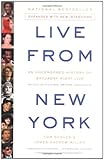Rex Sorgatz is a writer, designer, producer, and entrepreneur based in New York City. He currently works for Saturday Night Live and is a contributor at Wired magazine. His writing has appeared in New York, Gawker, Radar, and Spin. Former careers include being Executive Producer of msnbc.com and butchering fish in Alaska. He blogs the internet in real time at Fimoculous.com.
I lack conviction.
I planned to use this space to step up to the plate. I wanted to go to bat for something published in 2008. But I feared how you would perceive my choice: a sarcastic plea for a post-literate society? a cynical prognostication for the death of the book? a blatant mockery of the written word? a sneering wink to the puerile blogosphere for overthrowing the printed page?
 Yep, my favorite book published in 2008 was Hot Chicks With Douchebags.
Yep, my favorite book published in 2008 was Hot Chicks With Douchebags.
Wait!
I reserve the right to define “favorite” for a specialized sort of pleasure: this was the book that I kept picking up and paging through, the one I wanted other people to experience, the one that made me wish had a book club because it’s so goddamn mysterious and I needed other people to help guide me through its mystery.
You think I’m kidding.
But I dare you to page through this weird little picture book spun off from a blog – bustling with Hellenic characters, breathless photographic drama, complex anthropological signage, post-porn frisson, and a glossary! – and not feel entranced (or at least pleasantly beguiled). It’s a crazy mix of post-op feminism and hall-of-mirrors desire. Lacan would have eaten this shit up.
Nonetheless, despite the ponderous appeal of lechery on display, and my spineless inability to support low culture when it most needs it, declaring the douchebag tome as my favorite read this year would be a lie. Instead, a book released in 2002 about a television show that started in 1975 towered over all else for me this year.
But it requires a story….
Through an arcane sequence of unexpected events, I started working for Saturday Night Live at the end of 2008.
It made no sense to me either. But there I was, not as a writer, and definitely not as a performer, but as an internet dork trying to push SNL further into the digital age. Holding meetings in the writers’ room on the notorious 17th floor of 30 Rock, I could only think one thing:
I have no fucking business being here.
Every day I’d walk through the corridor where pictures of 34 seasons of cast members hung from walls. To say I was intimidated is like saying Belushi dabbled.
Like you, and maybe like your mom, I grew up on Saturday Night Live, through good years and bad years. And also probably like you, a newfound appreciation of the show arrived this year, as critics seemed to treat its satiric value as the second-coming of A Modest Proposal.
Though an avid fan, I was not a historical one – yet at work I was trapped in a sea of historical experts. When a name was dropped that I didn’t recognize, I would sheepishly ask who it was referring to. An answer like “He wrote Coneheads” would magnify my ignorance.
I clearly needed to study.
 My girlfriend, who is one of those people who knows the show’s history like others know the Torah, recommended Live From New York, an oral history collected by Tom Shales and Jim Miller. Of course I soon discovered it was not only the definitive book about the show, but also one of the most revered popular culture books of all time.
My girlfriend, who is one of those people who knows the show’s history like others know the Torah, recommended Live From New York, an oral history collected by Tom Shales and Jim Miller. Of course I soon discovered it was not only the definitive book about the show, but also one of the most revered popular culture books of all time.
Did you know there was an adult version of “The Muppets” in the show’s first season? Did you know that Howard Cosell had a show called Saturday Night Live at the same time? Did you know the show started because Johnny Carson wanted to stop running re-runs of The Tonight Show on Saturday nights? Did you know that Bill Murray and Chevy Chase got into a fistfight right before Chevy went on for his monologue in the second season? Did you know that innocuous phrases like “that sucks” couldn’t get past the sensors in the early years? Did you know about the drugs? (Okay, you probably knew about the drugs.)
This isn’t so much a history of a show as it is a history of an era. Having come of age around media startups, I love stories about how things begin. And this oral history is essentially the rattling, sputtering, clanking noises made when trying to start something new.









